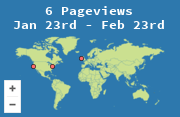Africa’s contribution to world knowledge is shrinking and more students choose to study overseas, writes Johann Mouton in the Beeld newspaper. There is a need to build out Africa’s ability to produce knowledge he says.
Today’s economy and society are increasingly dependent on knowledge to ensure progress, and internationally universities are assuming the responsibility to produce that type of scientific knowledge and to disseminate it. This trend however is not happening in Africa, and especially in Africa South of the Sahara.
African countries very often lack research laboratoria, and government institutions with abundant resources. Many of these countries experience huge debt problems resulting from factors ranging from civil wars to globalisation. This has made these countries more dependent on international help. The problem with this according to Mouton is that these international institutions (especially the World Bank) rather support Basic Education than Higher Education. Reasons for this are that investments in primary and secondary education result in far better returns, and secondly that Basic Education is seen as a basic human right.
This led to a shift in focus more on basic education with a resultant decline in funding to higher education institutions. This in turn led to a brain drain, with scores of academics streaming to developed countries and to the private sector.
Mouton cites a study by the University of Leiden’s Centre for Science and Technology, indicating that the contribution of Africa South of the Sahara to world science in 1996 was only 0.7% .
Africa’s was at it highest point in 1987 according to Mouton, but since then Africa has lost 11 % of its contribution to world science, and 31 % in Africa South of the Sahara.
Other factors responsible for this downward trend mentioned in Mouton’s article are:
- Internal factors at African universities: – University adminstrators are very often government appointees, which have an impact on decision making processes.
- Intellect-pull effect: – postgraduate students that continue their studies at institutions outside their own countries because of lack of resources and inadequate Masters and Doctorate programmes in their home countries.
Mouton also cites UNESCO’s outward mobility rate, which measures the number of students that studies overseas. This shows that 87 % of Botswana’s students are studying outside the country, and 30 % of students from Zimbabwe, Lesotho, Namibia, Swaziland and Mauritius are studying outside their countries. South Africa though has a high inward mobility rate because many of the students from these countries are continuing their studies here, but the most popular destinations are the United Kingdom and the United States.
Mouton pleads for the establishment of a dedicated capacity building centre that will support, strengthen and invigorate African expertise and knowledge, giving as an example the African Doctoral Academy at the University of Stellenbosch.
Johann Mouton is the director of the African Doctoral Academy (ADA) in the Faculty of Arts at the University of Stellenbosch.
To read more go to Johann Mouton’s original article in Afrikaans that was published in the Beeld newspaper of 2 December 2011. Click Here to access the article.
Filed under: Edu News (Africa), Edu News (South Africa), Higher Education, Statistics, universities | Tagged: Africa, African Doctoral Academy, contribution, decline, downward trend, Higher Education, Johann Mouton, knowledge production, research, scientific knowledge, universities, world science | Comments Off on Africa’s contribution to world science is shrinking








